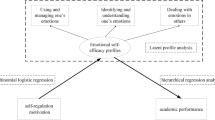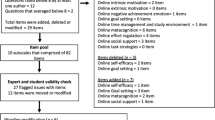Abstract
This study examines a person-centered approach to self-regulated learning among 606 University students (140 online, and 466 in blended learning mode). Latent profile analysis revealed five distinct profiles of self-regulated learning: minimal regulators, restrained regulators, calm self-reliant capable regulators, anxious capable collaborators, and super regulators. These profiles showed that: (1) differences in academic success are associated with a learner’s capacity for motivational regulation and self-regulated learning strategy implementation, (2) online learners are more likely to belong to profiles that are more adaptive, and less reliant on collaborations with others, (3) for learners at the lower end of the self-regulation spectrum, an increase in both motivational regulation and adoption of self-regulated learning strategies may be academically beneficial, and (4) high motivational regulation and strategy adoption can be all for naught, if the student is also highly anxious with worry and concern regarding performance.

Similar content being viewed by others
References
Abar, B., & Loken, E. (2010). Self-regulated learning and self-directed study in a pre-college sample. Learning and Individual Differences, 20(1), 25–29.
Ajzen, I. (2002). Constructing a TPB questionnaire: Conceptual and methodological considerations. http://chuang.epage.au.edu.tw/ezfiles/168/1168/attach/20/pta_41176_7688352_57138.pdf.
Allen, E. I., Seaman, J., Poulin, R., & Taylor Straut, T. (2016). Online report card. Tracking online education in the United States. Babson Survey Research Group and Quahog Research Group.
Azevedo, R., Cromley, J. G., & Seibert, D. (2004). Does adaptive scaffolding facilitate students’ ability to regulate their learning with hypermedia? Contemporary Educational Psychology, 29(3), 344–370.
Azevedo, R., Cromley, J. G., Winters, F. I., Moos, D. C., & Greene, J. (2005). Adaptive human scaffolding facilitates adolescents’ self-regulated learning with hypermedia. Instructional Science, 33, 381–412.
Barak, M., Hussein-Farraj, R., & Dori, Y. J. (2016). On-campus or online: Examining self-regulation and cognitive transfer skills in different learning settings. International Journal of Educational Technology in Higher Education, 13(1), 35.
Barnard-Brak, L., Paton, V. O., & Lan, W. Y. (2010). Profiles in self-regulated learning in the online learning environment. The International Review of Research in Open and Distributed Learning, 11(1), 61–80.
Bouhnik, D., & Marcus, T. (2006). Interaction in distance-learning courses. Journal of the American Society Information Science and Technology, 57(3), 299–305.
Bråten, I., & Olaussen, B. S. (2005). Profiling individual differences in student motivation: A longitudinal cluster-analytic study in different academic contexts. Contemporary Educational Psychology, 30(3), 359–396.
Broadbent, J. (2017). Comparing online and blended learner’s self-regulated learning strategies and academic performance. The Internet and Higher Education, 33, 24–32.
Broadbent, J., & Poon, W. L. (2015). Self-regulated learning strategies and academic achievement in online higher education learning environments: A systematic review. The Internet and Higher Education, 27, 1–13.
Carver, C. S., & Scheier, M. F. (1998). On the self-regulation of behaviour. New York: Cambridge University Press.
Chen, J. A., & Usher, E. L. (2013). Profiles of the sources of science self-efficacy. Learning and Individual Differences, 24(1), 11–21.
Cohen, J. W. (1988). Statistical power analysis for the behavioral sciences (2nd ed.). Hillsdale, NJ: Lawrence Erlbaum Associates.
Cunningham, C. A., & Billingsley, M. (2002). Curriculum webs: A practical guide to weaving the web into teaching and learning (2nd ed.). Boston: Allyn & Bacon, Inc.
Delen, E., Liew, J., & Willson, V. (2014). Effects of interactivity and instructional scaffolding on learning: Self-regulation in online video-based environments. Computers and Education, 78, 312–320.
Eysenck, M. W. (2001). Principles of cognitive psychology. Hove, East Sussex: Psychology Press.
Gardner, B., Abraham, C., Lally, P., & de Bruijn, G. J. (2012). Towards parsimony in habit measurement: Testing the convergent and predictive validity of an automaticity subscale of the self-report habit index. International Journal of Behavioral Nutrition and Physical Activity, 9(1), 102.
Greene, J. A., Moos, D. C., & Azevedo, R. (2011). Self-regulation of learning with computer-based learning environments. New Directions for Teaching and Learning, 126, 107–115.
Heikkilä, A., & Lonka, K. (2006). Studying in higher education: students’ approaches to learning, self-regulation, and cognitive strategies. Studies in Higher Education, 31(1), 99–117.
Heikkilä, A., Lonka, K., Nieminen, J., & Niemivirta, M. (2012). Relations between teacher students’ approaches to learning, cognitive and attributional strategies, well-being, and study success. Higher Education, 64(4), 455–471.
Heikkilä, A., Niemivirta, M., Nieminen, J., & Lonka, K. (2011). Interrelations among university students’ approaches to learning, regulation of learning, and cognitive and attributional strategies: A person oriented approach. Higher Education, 61(5), 513–529.
Henry, M. K., Pooley, J., & Omari, M. (2014). Student motivations for studying online: A qualitative study. In Proceedings of Teaching and Learning Forum. Perth, WA: The University of Western Australia.
Hoff, E., & Laursen, B. P. (2006). Person-centered and variable-centered approaches to longitudinal data. Merrill-Palmer Quarterly, 52(3), 377–389.
Honicke, T., & Broadbent, J. (2016). The influence of academic self-efficacy on academic performance: A systematic review. Educational Research Review, 17, 63–84.
IBM Corp. (2013). IBM SPSS Statistics for Macintosh, version 22.0. Armonk, NY: IBM Corp.
Johnson, G. M. (2015). On-campus and fully-online university students: Comparing demographics, digital technology use and learning characteristics. Journal of University Teaching and Learning Practice, 12(1), 1–13.
Kolić-Vehovec, S., Rončević, B., & Bajšanski, I. (2008). Motivational components of self-regulated learning and reading strategy use in university students: The role of goal orientation patterns. Learning and Individual Differences, 18(1), 108–113.
Lin, J. W., & Tsai, C. W. (2016). The impact of an online project-based learning environment with group awareness support on students with different self-regulation levels: An extended-period experiment. Computers and Education, 99, 28–38.
Liu, W. C., Wang, C. K. J., Kee, Y. H., Koh, C., Lim, B. S. C., & Chua, L. (2014). College students’ motivation and learning strategies profiles and academic achievement: A self-determination theory approach. Educational Psychology, 34(3), 338–353.
McLachlan, G., & Peel, D. (2000). Finite mixture models. New York: Wiley.
Means, B., Toyama, Y., Murphy, R., Bakia, M., & Jones, K. (2009). Evaluation of evidence-based practices in online learning: A meta-analysis and review of online learning studies. US Department of Education. http://eric.ed.gov/?id=ED505824
Moos, D. C., & Azevedo, R. (2008). Self-regulated learning with hypermedia: The role of prior domain knowledge. Contemporary Educational Psychology, 33, 270–298.
Moos, D. C., & Bonde, C. (2016). Flipping the classroom: Embedding self-regulated learning prompts in videos. Technology, Knowledge and Learning, 21, 225–242.
Muthén, L. K., & Muthén, B. O. (1998–2011). Mplus user’s guide (6th Ed.). Los Angeles: Muthén and Muthén.
Norton, A., & Cherastidtham, I. (2014). Mapping Australian higher education, 2014–15. Grattan Institute.
Norton, A., Sonnemann, J., McGannon, C. (2013). The online evolution: When technology meets tradition in higher education. Grattan Institute.
Pajares, F. (2002). Gender and perceived self-efficacy in self-regulated learning. Theory into Practice, 41, 116–125.
Pintrich, P. R. (1989). The dynamic interplay of student motivation and cognition in the college classroom. Advances in Motivation and Achievement, 6, 117–160.
Pintrich, P. R. (1991). A manual for the use of the Motivated Strategies for Learning Questionnaire (MSLQ). http://files.eric.ed.gov/fulltext/ED338122.pdf.
Pintrich, P. R., & De Groot, E. V. (1990). Motivational and self-regulated learning components of classroom academic performance. Journal of Educational Psychology, 82(1), 33.
Pintrich, P. R., Smith, D. A., García, T., & McKeachie, W. J. (1993). Reliability and predictive validity of the Motivated Strategies for Learning Questionnaire (MSLQ). Educational and Psychological Measurement, 53(3), 801–813.
Raftery, A. E. (1995). Bayesian model selection in social research. Sociological Methodology, 25, 111–163.
Richardson, M., Abraham, C., & Bond, R. (2012). Psychological correlates of university students’ academic performance: A systematic review and meta-analysis. Psychological Bulletin, 138(2), 353.
Robbins, S. B., Lauver, K., Le, H., Davis, D., Langley, R., & Carlstrom, A. (2004). Do psychosocial and study skill factors predict college outcomes? A meta-analysis. Psychological Bulletin, 130(2), 261.
Roblyer, M. D. (1999). Is choice important in distance learning? A study of student motives for taking internet-based courses at the high school and community college levels. Journal of Research on Computing in Education, 32, 157–171.
Sansigiry, S. S., & Sail, K. (2006). Effect of students’ perception of course loads on test anxiety. America Journal of Pharmaceutical Education, 70(2), 1–6.
Schellings, G., & Van Hout-Wolters, B. (2011). Measuring strategy use with self-report instruments: Theoretical and empirical considerations. Metacognition and Learning, 6(2), 83–90.
Schrum, L., & Hong, S. (2002). Dimensions and strategies for online success: Voices from experienced educators. Journal of Asynchronous Learning Networks, 6(1), 57–67.
Schwarz, G. (1978). Estimating the dimension of a model. Annals of Statistics, 6(2), 461–464.
Schwinger, M., Steinmayr, R., & Spinath, B. (2012). Not all roads lead to Rome—Comparing different types of motivational regulation profiles. Learning and Individual Differences, 22(3), 269–279.
Seipp, B. (1991). Anxiety and academic performance: A meta-analysis of findings. Anxiety Research, 4(1), 27–41.
Song, L., Singleton, E. S., Hill, J. R., & Koh, M. H. (2004). Improving online learning: Student perceptions of useful and challenging characteristics. The Internet and Higher Education, 7(1), 59–70.
Taub, M., Azevedo, R., Bouchet, F., & Khosravifar, B. (2014). Can the use of cognitive and metacognitive self-regulated learning strategies be predicted by learners’ levels of prior knowledge in hypermedia-learning environment? Computers in Human Behavior, 39, 356–367.
Timmons, A. C., & Preacher, K. J. (2015). The importance of temporal design: How do measurement intervals affect the accuracy and efficiency of parameter estimates in longitudinal research? Multivariate Behavioral Research, 50(1), 41–55.
Trevors, G., Duffy, M., & Azevedo, R. (2014). Note-taking within MetaTutor: Interactions between an intelligent tutoring system and prior knowledge on note-taking and learning. Educational Technology Research and Development, 62, 507–528.
Turner, J. C., Thorpe, P. K., & Meyer, D. K. (1998). Students’ reports of motivation and negative affect: A theoretical and empirical analysis. Journal of Educational Psychology, 90(4), 758.
Veenman, M. V. (2011a). Learning to self-monitor and self-regulate. In R. Mayer & P. Alexander (Eds.), Handbook of research on learning and instruction (pp. 197–218). New York: Routledge.
Veenman, M. V. (2011b). Alternative assessment of strategy use with self-report instruments: A discussion. Metacognition and Learning, 6(2), 205–211.
Wang, C. H., Shannon, D., & Ross, M. (2013). Students’ characteristics, self-regulated learning, technology self-efficacy, and course outcomes in online learning. Distance Education, 34(3), 302–323.
Yukselturk, E., & Bulut, S. (2009). Gender differences in self-regulated online learning environment. Educational Technology and Society, 12(3), 12–22.
Zimmerman, B. J. (1986). Becoming a self-regulated learner: Which are the key subprocesses? Contemporary Educational Psychology, 11(4), 307–313.
Zimmerman, B. J. (1989). A social cognitive view of self-regulated academic learning. Journal of Educational Psychology, 81(3), 329.
Zimmerman, B. J. (1990). Self-regulated learning and academic achievement: An overview. Educational Psychologist, 25(1), 3–17.
Zimmerman, B. J. (2015). Self-regulated Learning: Theories, measures, and outcomes. In International encyclopedia of the social and behavioral sciences. Elsevier. http://www.sciencedirect.com/science/article/pii/B9780080970868260601.
Zimmerman, B. J., Bandura, A., & Martinez-Pons, M. (1992). Self-motivation for academic attainment: The role of self-efficacy beliefs and personal goal setting. American Educational Research Journal, 29(3), 663–676.
Zimmerman, B. J., & Martinez-Pons, M. (1990). Student differences in self-regulated learning: Relating grade, sex, and giftedness to self-efficacy and strategy use. Journal of Educational Psychology, 82(1), 51–59.
Zimmerman, B. J., & Schunk, D. H. (2011). Handbook of self-regulation of learning and performance. New York: Routledge.
Acknowledgements
Authors wish to thank Mr. Walter Poon, Ms. Toni Honicke, Ms. Arial McCarthy, Ms. Prue Cauley, Ms. Laura Larkin, Ms. Nhu Nguyen, Mr. Mulia Marzuki and Mr. Vic Vrsecky for their assistance with data collection.
Author information
Authors and Affiliations
Corresponding author
Ethics declarations
Conflict of interest
The authors declare that they have no conflict of interest.
Rights and permissions
About this article
Cite this article
Broadbent, J., Fuller-Tyszkiewicz, M. Profiles in self-regulated learning and their correlates for online and blended learning students. Education Tech Research Dev 66, 1435–1455 (2018). https://doi.org/10.1007/s11423-018-9595-9
Published:
Issue Date:
DOI: https://doi.org/10.1007/s11423-018-9595-9




